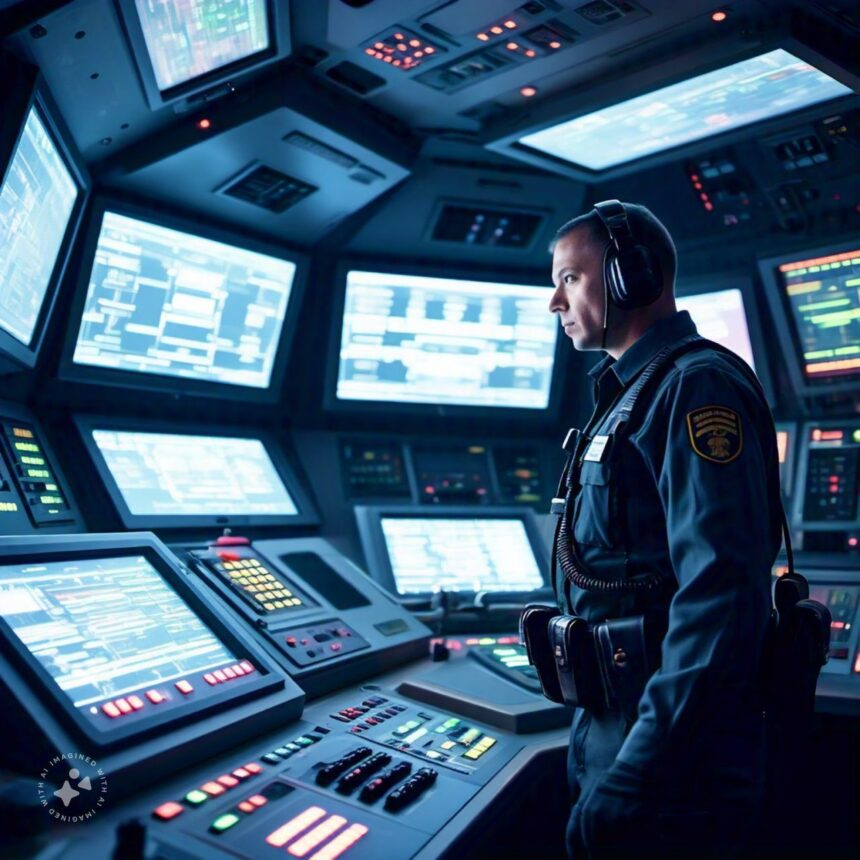The Role of Technology in Enhancing Security Guard Efficiency
In today’s rapidly evolving security landscape, technology plays a crucial role in boosting the efficiency of security guards. With the advent of advanced tools and systems, security personnel are now able to provide enhanced protection, respond to incidents quickly, and ensure a higher level of safety. This post will explore how technology is transforming security guard operations and enhancing their overall effectiveness.
1. Introduction to Technology in Security Operations
Technology is revolutionizing how security personnel perform their duties. From surveillance cameras to advanced monitoring systems, technology provides security guards with tools that improve response time, accuracy, and efficiency. It enhances their ability to detect threats early and respond promptly, which is crucial in today’s security environment.
2. The Impact of Surveillance Technology
Modern surveillance systems, including high-definition cameras and motion sensors, allow security guards to monitor large areas effectively. These technologies not only help in capturing real-time footage but also assist in providing evidence when needed. Security guards can view multiple camera feeds from a central location, reducing the need to patrol the entire premises manually.
3. Integrated Alarm Systems for Faster Response
Advanced alarm systems are a game changer for security operations. They enable security guards to receive instant alerts whenever there is a security breach or unusual activity. These systems often integrate with cameras and sensors, providing real-time notifications that help security personnel respond swiftly, minimizing potential threats and ensuring timely intervention.
4. Drones: The Future of Security Surveillance
Drones are becoming an increasingly popular tool in security operations. Equipped with cameras and other monitoring devices, drones offer a bird’s-eye view of a property or area, enabling security guards to oversee larger areas than would be possible on foot. This is particularly valuable for monitoring hard-to-reach locations or large-scale events.
5. Mobile Patrol Apps for Streamlined Security Monitoring
With the development of mobile apps, security guards can now perform their duties more efficiently. These apps enable guards to track patrol routes, document incidents, and communicate with team members in real time. They can also record details of their shifts and activities, ensuring accurate reports and enhancing accountability.
6. Access Control Systems for Increased Safety
Access control technology, such as biometric scanners, keycards, and mobile credentials, provides an added layer of security by controlling who can enter restricted areas. Security guards can easily manage entry points and track visitors with these systems. By automating access control, security personnel can focus on more critical tasks, knowing that unauthorized access is being monitored.
7. Real-Time Communication Tools for Better Coordination
Efficient communication is essential in security operations. With the help of walkie-talkies, radios, and mobile communication devices, security guards can stay connected with each other and their supervisors throughout their shifts. These tools enable quick dissemination of information, ensuring that guards can coordinate responses swiftly in emergency situations.
8. Cloud-Based Reporting Systems
Cloud technology has simplified the reporting process for security guards. Cloud-based reporting systems allow guards to document incidents and security breaches from anywhere, and supervisors can review reports in real time. This not only saves time but also ensures that security information is securely stored and easily accessible for future reference.
9. AI and Machine Learning in Threat Detection
Artificial intelligence (AI) and machine learning are being integrated into security systems to predict and detect potential threats. By analyzing patterns in surveillance footage and sensor data, AI can identify unusual activity, such as unauthorized individuals or suspicious behaviors, and alert security guards before incidents escalate. This proactive approach increases the chances of preventing security breaches.
10. The Benefits of Automated Reporting and Documentation
Automated reporting tools allow security guards to streamline documentation tasks. Instead of manually filling out incident reports, guards can quickly generate reports using templates and data gathered from their mobile devices. This reduces human error, saves time, and ensures that reports are consistent and accurate, which is crucial for legal and operational purposes.
11. Enhancing Security Guard Training with Virtual Reality (VR)
Virtual reality (VR) is transforming security guard training by providing immersive, realistic scenarios. VR simulations allow guards to practice handling various situations, such as active shooter scenarios or fire evacuations, in a safe and controlled environment. This type of training enhances decision-making skills and prepares guards for real-life emergencies, boosting their confidence and effectiveness.
12. Smart Analytics: Optimizing Security Performance
Smart analytics provide security teams with data-driven insights that help optimize their operations. By collecting and analyzing data from various sources such as cameras, sensors, and mobile apps, security managers can identify areas for improvement. These insights enable better deployment of resources, improved shift scheduling, and more efficient security management.
13. Reducing Guard Fatigue with Technology
Long shifts and monotonous tasks can lead to guard fatigue, affecting performance and response time. Technology can help reduce fatigue by automating repetitive tasks and providing guards with real-time data, so they can focus on critical areas. Additionally, wearables and health monitoring systems can alert supervisors if a guard is feeling fatigued or unwell, ensuring that they receive the necessary support.
14. The Role of Data Security in Enhancing Guard Efficiency
Data security is crucial when it comes to protecting sensitive information. Security personnel handle large amounts of data daily, including access logs and surveillance footage. Implementing strong cybersecurity measures ensures that this data remains safe from unauthorized access or cyber threats, maintaining trust in security operations and preventing potential security breaches.
15. The Future of Security Guard Operations: Technology Integration
As technology continues to advance, security guard operations will become more efficient and effective. The integration of advanced technologies such as AI, drones, and cloud computing will further enhance security protocols, making security teams more proactive and responsive. By adopting these technologies, security companies can provide their clients with a higher level of service and safety for more blog.
Frequently Asked Questions (FAQs)
Q1: How does technology improve security guard efficiency?
Technology enhances security guard efficiency by automating routine tasks, providing real-time data, improving communication, and helping guards respond to incidents quickly and effectively.
Q2: What role do drones play in security guard operations?
Drones provide an aerial view of large areas, enabling security guards to monitor properties more effectively, especially in hard-to-reach locations, and enhance surveillance coverage.
Q3: How do mobile apps assist security guards?
Mobile apps streamline tasks such as tracking patrol routes, documenting incidents, and maintaining communication with team members, allowing guards to perform their duties more efficiently.
Q4: Can artificial intelligence help in detecting security threats?
Yes, AI and machine learning can analyze patterns in surveillance data to detect unusual activities, alerting security personnel about potential threats before they escalate.
Q5: What are the benefits of cloud-based reporting systems?
Cloud-based systems allow security guards to document incidents and share reports in real time, ensuring accuracy, reducing paperwork, and making it easier to access and review reports.
Q6: How does technology help prevent security guard fatigue?
Technology helps reduce fatigue by automating repetitive tasks, providing real-time data for better decision-making, and using wearables to monitor guards’ well-being during shifts.
By integrating cutting-edge technologies into security operations, companies like SSP Australia (visit here) are ensuring that security personnel are more effective, responsive, and capable of handling the complex challenges of modern security environments.
This comprehensive guide provides a clear understanding of how technology enhances security guard efficiency and highlights the benefits of adopting these innovations in the field.








